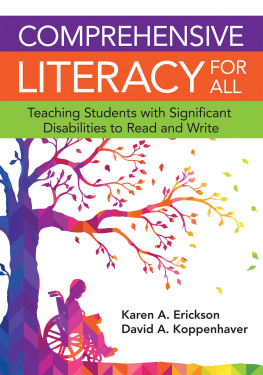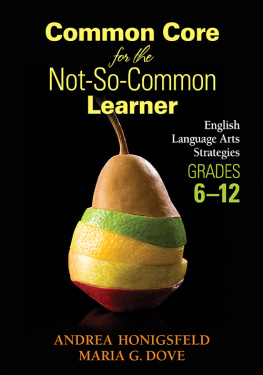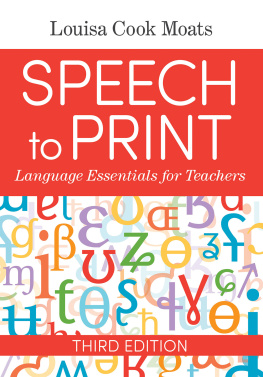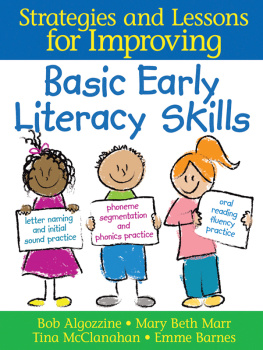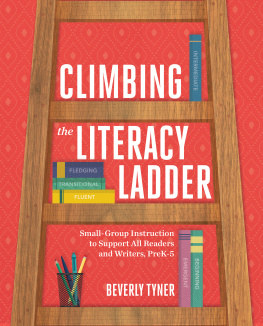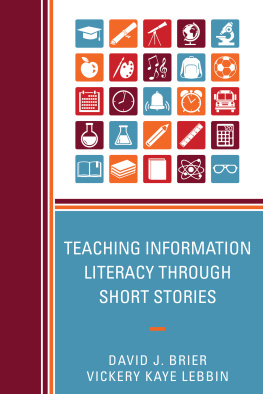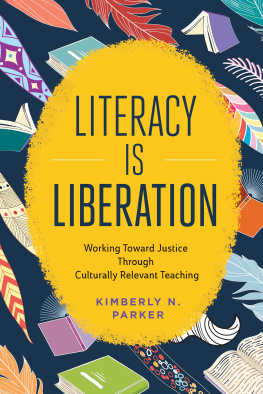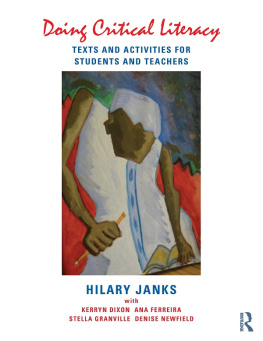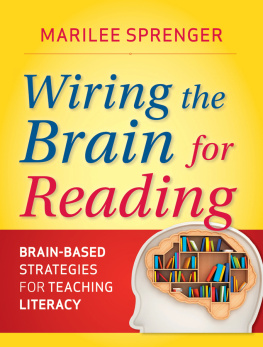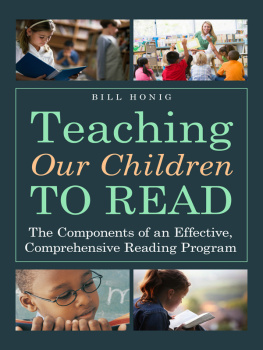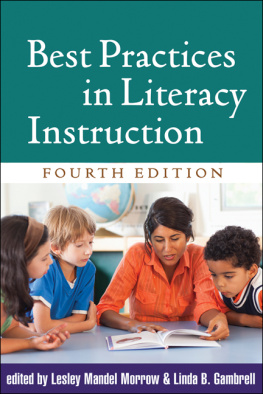
Table of Contents
Guide
Page List


Paul H. Brookes Publishing Co.
Post Office Box 10624
Baltimore, Maryland 21285-0624
USA
www.brookespublishing.com
Copyright 2020 by Paul H. Brookes Publishing Co., Inc.
All rights reserved.
Paul H. Brookes Publishing Co. is a registered trademark of Paul H. Brookes Publishing Co., Inc.
The individuals described in this book are composites or real people whose situations are masked and are based on the authors experiences. In all instances, names and identifying details have been changed to protect confidentiality.
Purchasers of Comprehensive Literacy for All: Teaching Students With Significant Disabilities to Read and Write are granted permission to download, print, and photocopy the lesson outlines in the text for educational purposes. These forms may not be reproduced to generate revenue for any program or individual. Photocopies may only be made from an original book. Unauthorized use beyond this privilege may be prosecutable under federal law. You will see the copyright protection notice at the bottom of each photocopiable page.
Library of Congress Cataloging-in-Publication Data
Names: Erickson, Karen A., author. | Koppenhaver, David, 1956- author.
Title: Comprehensive literacy for all : teaching students with significant disabilities to read and write / by Karen Erickson, Ph.D., Department of Allied Health Sciences, University of North Carolina at Chapel Hill and David A. Koppenhaver, Ph.D., Department of Reading Education and Special Education, Appalachian State University, Boone, North Carolina.
Description: Baltimore, Maryland : Paul H. Brookes Publishing Co., [2019] | Includes bibliographical references and index.
Identifiers: LCCN 2019026326 (print) | LCCN 2019026327 (ebook) | ISBN 9781598576573 (paperback) | ISBN 9781681253732 (epub) | ISBN 9781681253749 (pdf)
Subjects: LCSH: Learning disabled childrenEducation. | ReadingRemedial teaching. | English languageComposition and exercisesStudy and teaching (Elementary) | LiteracyStudy and teaching.
Classification: LCC LC4704 .E75 2020 (print) | LCC LC4704 (ebook) | DDC 371.91/44dc23
LC record available at https://lccn.loc.gov/2019026326
LC ebook record available at https://lccn.loc.gov/2019026327
British Library Cataloguing in Publication data are available from the British Library.
Version 1.0
Table of Contents
David E. Yoder
About the Downloads
Purchasers of this book may download, print, and/or photocopy sample lesson outlines for educational use. These materials appear in the print book and are also available at http://downloads.brookespublishing.com for both print and e-book buyers. To access the materials that come with the book
1.Go to the Brookes Publishing Download Hub: http://downloads.brookespublishing.com
2.Register to create an account (or log in with an existing account)
3.Filter or search for your book title
About the Authors
Karen A. Erickson, Ph.D., David E. and Dolores J. Dee Yoder Distinguished Professor of Literacy and Disabilities and Director, Center for Literacy and Disability Studies, Department of Allied Health Sciences, University of North Carolina at Chapel Hill
Karen Erickson is Director of the Center for Literacy and Disability Studies, Professor in the Division of Speech and Hearing Sciences, and the Yoder Distinguished Professor in the Department of Allied Health Sciences at the University of North Carolina at Chapel Hill. She is a former classroom teacher whose research addresses literacy and communication intervention and assessment for students with significant disabilities.
David A. Koppenhaver, Ph.D., Professor, Department of Reading Education and Special Education, Appalachian State University, Boone, North Carolina
David Koppenhaver is a professor in the Department of Reading Education and Special Education at Appalachian State University and the cofounder with David Yoder of the Center for Literacy and Disability Studies at the University of North Carolina at Chapel Hill. He is a former language arts teacher whose research addresses literacy learning and instruction of individuals with significant disabilities.
Foreword
Thirty years ago, I would ask graduate students and workshop participants consisting of speech-language clinicians and teachers of children with significant disabilities (primarily children for whom speech was not a major means of communication), How many of you believe the persons for whom you are providing services can learn to read and write? Reluctantly, about 20%30% would raise their hands, and I had the feeling the majority of the others were unable to commit themselves. When I pursued why the attendees thought nonspeaking children with significant disabilities could not learn to read, they would usually respond with, Speech is a prerequisite to reading. Pushing the issue further for evidence of their belief, it appeared to hinge mostly on little more than a hunch or something they had heard someone say or read in an outdated textbook that learning to read could not happen without speech. How is it, I would ask, that children who are deaf, without oral language and communicate primarily with sign language, learn to read? Have we forgotten that there is evidence of language comprehension that allows us to formulate a means of communicating, including reading and writing? Yes, but and but and but, would be the usual responses.
How then does one break this faulty thinking and practice? One has to look for the evidence that people with significant disabilities can learn to read and write; they can become literate. Therein was the challenge that was put before some of us who believed that no one is too anything to learn to read and writenot too intellectually, emotionally, neurologically, or physically challenged to learn to read and write; to become literate (Yoder, 2001). Or those of us who agree with the writer Pat Conroy (1995), who said, One can do anything, anything at all, if provided with a passionate and gifted teacher (p. 380).
In 1989, David Koppenhaver and I began dreaming things that never were, and said why not? (Shaw, 1921, Part 1, Act 1). We established a literacy center that initially focused on teaching children for whom speech was not a primary means of communication to read and write. From the initial grant from the Kate B. Reynolds Foundation, the center has evolved, providing evidence-based research on effective ways to teach people with significant disabilities to read and write. This book you are about to read will challenge you to provide a reading and writing program for all people with significant disabilities, and we believe, when you finish studying the information the book provides, you will raise your hand in belief that people with significant disabilities can learn to read and write, and you will endorse our collective belief statement:
It is our collective belief and practice that all individuals regardless of ability or disability have the right to an opportunity to learn to read and write in order to increase and enhance their communicative competence, their educational opportunities for vocational success, self-empowerment capabilities, and independence.
Next page
